-
 Bitcoin
Bitcoin $117600
0.25% -
 Ethereum
Ethereum $4424
0.10% -
 XRP
XRP $3.101
0.50% -
 Tether USDt
Tether USDt $1.001
-0.01% -
 BNB
BNB $836.2
1.26% -
 Solana
Solana $188.8
2.11% -
 USDC
USDC $1.000
0.01% -
 Dogecoin
Dogecoin $0.2301
0.57% -
 TRON
TRON $0.3485
-1.00% -
 Cardano
Cardano $0.9209
-1.34% -
 Hyperliquid
Hyperliquid $46.72
-1.19% -
 Chainlink
Chainlink $22.62
4.84% -
 Stellar
Stellar $0.4275
-0.38% -
 Sui
Sui $3.761
1.91% -
 Bitcoin Cash
Bitcoin Cash $586.7
-0.25% -
 Ethena USDe
Ethena USDe $1.001
0.01% -
 Hedera
Hedera $0.2510
2.06% -
 Avalanche
Avalanche $24.21
2.22% -
 Litecoin
Litecoin $119.7
1.07% -
 Toncoin
Toncoin $3.450
1.06% -
 UNUS SED LEO
UNUS SED LEO $9.411
-0.93% -
 Shiba Inu
Shiba Inu $0.00001298
1.20% -
 Uniswap
Uniswap $10.98
3.25% -
 Polkadot
Polkadot $3.961
2.16% -
 Dai
Dai $1.000
0.00% -
 Bitget Token
Bitget Token $4.642
0.95% -
 Cronos
Cronos $0.1514
0.57% -
 Ethena
Ethena $0.7290
3.78% -
 Monero
Monero $254.1
7.69% -
 Pepe
Pepe $0.00001102
2.47%
Does the generation of private keys require an internet connection?
Generating cryptocurrency private keys requires no internet connection; offline generation, using a hardware or reputable offline software wallet, is crucial for security, preventing key interception and ensuring complete control.
Mar 25, 2025 at 01:57 pm
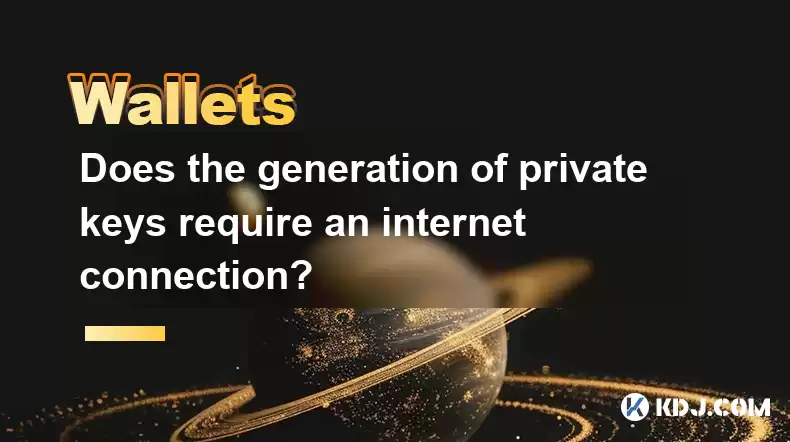
Key Points:
- Private key generation is a fundamentally offline process.
- Internet connection is not required for generating a secure private key.
- Online key generators carry significant security risks.
- Offline generation ensures complete control and security of your keys.
- Understanding the process and potential risks is crucial for cryptocurrency security.
Does the generation of private keys require an internet connection?
No, the generation of private keys for cryptocurrencies does not require an internet connection. In fact, generating a private key offline is the safest and most recommended method. Private keys are essentially long strings of random numbers. They are generated through cryptographic algorithms, and these algorithms operate solely on the device generating the key; no external data or connection is necessary. The security of your cryptocurrency hinges on the secrecy of your private key, so keeping the generation process offline is paramount.
The process of generating a private key involves complex mathematical calculations. These calculations are performed by specialized software or hardware wallets. These wallets use random number generators (RNGs) to create the keys. The quality of the RNG directly impacts the security of your key. High-quality RNGs, often found in dedicated hardware wallets, are crucial for generating unpredictable and secure private keys.
Think of it like this: you can write down a secret code on a piece of paper without needing to be connected to the internet. That secret code is analogous to your private key. The internet provides no assistance in the creation of this code. In fact, connecting to the internet during this process introduces unnecessary risks.
Using an online key generator is strongly discouraged. Such generators expose your keys to potential attacks and compromise your security. Hackers could potentially intercept your keys during the generation process, leading to the theft of your cryptocurrency. The online generator might itself be compromised, allowing malicious actors to steal your keys.
To generate a private key securely, you need a reliable source of randomness and a trusted software or hardware wallet. The software should be downloaded from the official source and verified to be free of malware. Hardware wallets offer enhanced security as they generate and store private keys in a physically isolated environment.
Let's delve deeper into the methods for generating private keys offline:
- Using a Hardware Wallet: This is the most secure method. Hardware wallets, such as Ledger or Trezor, generate keys entirely offline within their secure element, a specialized chip designed for cryptographic operations. The private keys never leave the device.
- Using Offline Software Wallets: Some software wallets allow for offline key generation. This usually involves creating a new wallet without connecting to the internet. Ensure the software is downloaded from a trusted source and verified for authenticity before use.
- Using Deterministic Wallets: These wallets derive multiple keys from a single seed phrase. While the seed phrase is crucial and must be kept extremely secure, the generation of individual keys from the seed can be done offline. Remember that your seed phrase holds the power to access all your keys, so secure storage is paramount.
Step-by-step guide to offline private key generation using a hardware wallet (example):
- Obtain a hardware wallet: Purchase a reputable hardware wallet from a trusted vendor.
- Unbox and connect (briefly): Connect the wallet to your computer to initially set it up.
- Create a new wallet: Follow the instructions provided by the manufacturer to create a new wallet completely offline after the initial setup. This usually involves disconnecting from the internet and following the on-device prompts.
- Write down the seed phrase: Carefully write down your seed phrase (recovery phrase) on paper. This is crucial for recovering your wallet if the device is lost or damaged. Store it securely.
- Disconnect from the internet: Ensure your device is completely disconnected from the internet during the entire key generation process.
- Verify the seed phrase: The wallet will likely ask you to confirm your seed phrase by entering it again to ensure you have written it correctly.
Remember that the specific steps might vary slightly depending on the brand and model of the hardware wallet. Always refer to the official documentation provided by the manufacturer for precise instructions.
Common Questions:
Q: Can I generate a private key using a simple script or program?
A: While technically possible, it's extremely risky. You'll need to ensure the script is perfectly secure and free from malicious code. Using a well-established hardware or software wallet is far safer.
Q: What happens if I lose my private key?
A: You lose access to your cryptocurrency. There's no recovery mechanism if you lose your private key. This is why secure storage of your seed phrase is paramount.
Q: Are all private keys equally secure?
A: The security depends on how they are generated. Keys generated using weak random number generators are more vulnerable to attacks. Hardware wallets generally offer the strongest security.
Q: Can I generate a private key on my smartphone?
A: Yes, but only if you use a reputable and trusted mobile wallet app that allows for offline key generation and has strong security measures. This is less secure than a hardware wallet.
Q: Why is offline key generation important?
A: It eliminates the risk of your private key being intercepted or compromised during the generation process by malicious actors or compromised software. Offline generation gives you complete control and ensures the security of your funds.
Disclaimer:info@kdj.com
The information provided is not trading advice. kdj.com does not assume any responsibility for any investments made based on the information provided in this article. Cryptocurrencies are highly volatile and it is highly recommended that you invest with caution after thorough research!
If you believe that the content used on this website infringes your copyright, please contact us immediately (info@kdj.com) and we will delete it promptly.
- Kazakhstan's Crypto Leap: Bitcoin ETF and Central Asia's Digital Finance Future
- 2025-08-13 12:45:19
- BlockDAG Presale Blazes Past $371M: Fundraising Frenzy Fuels Crypto Sensation
- 2025-08-13 13:05:21
- Meme Coins: Chasing the 2025 Surge – Which Will Moonshot?
- 2025-08-13 10:25:23
- Bitcoin's Wild Ride: Rally, Pullback, and What's Next
- 2025-08-13 10:25:23
- Bitcoin, Bitmax, and Institutional Demand: A New Era of Crypto Investment
- 2025-08-13 10:45:12
- Solana, ROAM, and Airdrops: What's the Buzz in 2025?
- 2025-08-13 11:35:13
Related knowledge
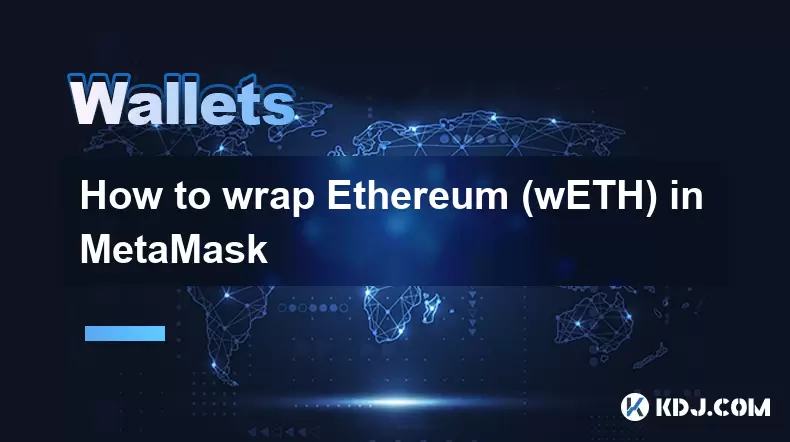
How to wrap Ethereum (wETH) in MetaMask
Aug 13,2025 at 11:36am
Understanding Wrapped Ethereum (wETH)Wrapped Ethereum (wETH) is a tokenized version of native Ethereum (ETH) that conforms to the ERC-20 standard, ena...

How to manage your portfolio in Exodus wallet
Aug 08,2025 at 10:07pm
Understanding the Exodus Wallet InterfaceThe Exodus wallet is a non-custodial cryptocurrency wallet that supports a wide range of digital assets. When...
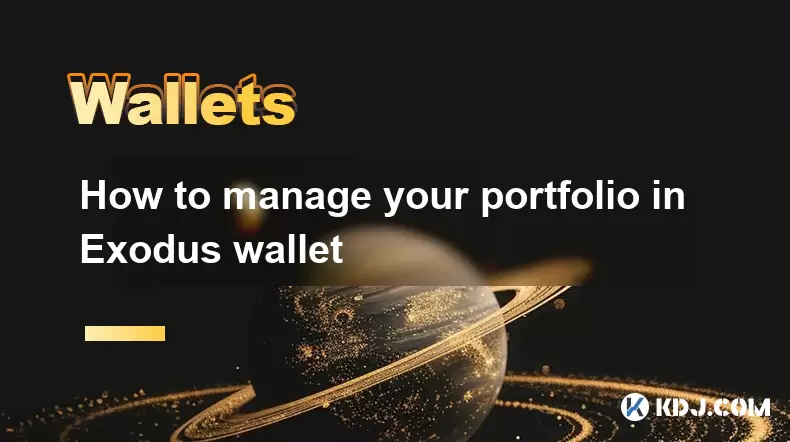
How to manage your portfolio in Exodus wallet
Aug 13,2025 at 11:35am
Understanding the Exodus Wallet InterfaceThe Exodus wallet is a non-custodial cryptocurrency wallet that supports a wide range of digital assets. Upon...

How to reset your MetaMask password
Aug 08,2025 at 01:28pm
Understanding the MetaMask Password Reset ProcessMany users confuse the MetaMask password with the seed phrase or private key, but they serve differen...
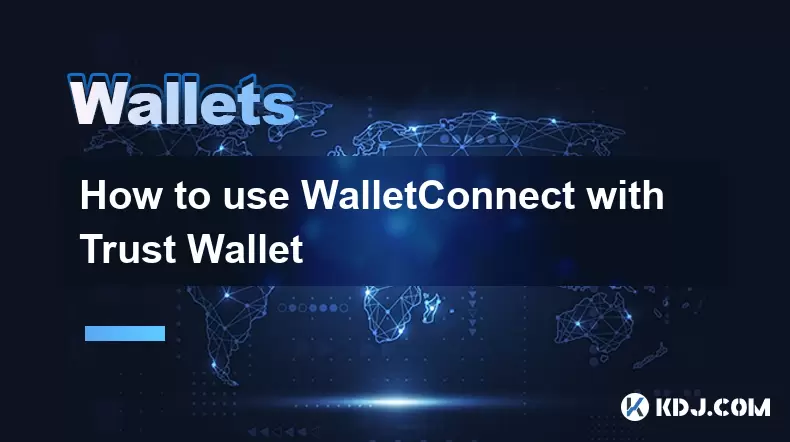
How to use WalletConnect with Trust Wallet
Aug 13,2025 at 01:07am
What Is WalletConnect and Why It Matters for Trust Wallet UsersWalletConnect is an open-source protocol that enables secure communication between dece...
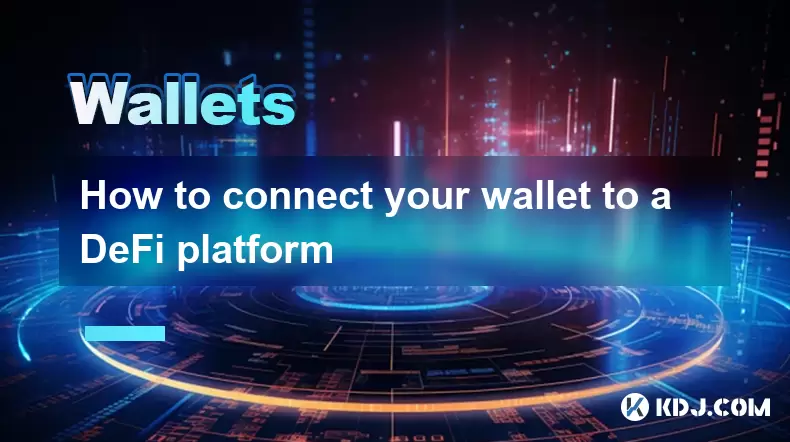
How to connect your wallet to a DeFi platform
Aug 13,2025 at 11:36am
Understanding Wallet Compatibility with DeFi PlatformsBefore connecting your wallet to any DeFi platform, it's essential to ensure your wallet is comp...

How to wrap Ethereum (wETH) in MetaMask
Aug 13,2025 at 11:36am
Understanding Wrapped Ethereum (wETH)Wrapped Ethereum (wETH) is a tokenized version of native Ethereum (ETH) that conforms to the ERC-20 standard, ena...

How to manage your portfolio in Exodus wallet
Aug 08,2025 at 10:07pm
Understanding the Exodus Wallet InterfaceThe Exodus wallet is a non-custodial cryptocurrency wallet that supports a wide range of digital assets. When...

How to manage your portfolio in Exodus wallet
Aug 13,2025 at 11:35am
Understanding the Exodus Wallet InterfaceThe Exodus wallet is a non-custodial cryptocurrency wallet that supports a wide range of digital assets. Upon...

How to reset your MetaMask password
Aug 08,2025 at 01:28pm
Understanding the MetaMask Password Reset ProcessMany users confuse the MetaMask password with the seed phrase or private key, but they serve differen...

How to use WalletConnect with Trust Wallet
Aug 13,2025 at 01:07am
What Is WalletConnect and Why It Matters for Trust Wallet UsersWalletConnect is an open-source protocol that enables secure communication between dece...

How to connect your wallet to a DeFi platform
Aug 13,2025 at 11:36am
Understanding Wallet Compatibility with DeFi PlatformsBefore connecting your wallet to any DeFi platform, it's essential to ensure your wallet is comp...
See all articles

























































































